KGH lands major role in Covid-19 sniffer dog trial
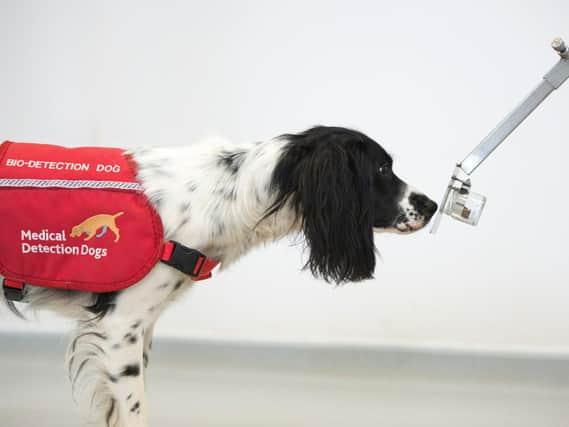

Staff at Kettering General Hospital are playing a key role in a potentially 'game-changing' trial to see if dogs can sniff out Covid-19 in humans.
The hospital has signed up 92 employees to provide odour samples for bio-detection dogs in the national scheme - more than any hospital trust in the country.
Advertisement
Hide AdAdvertisement
Hide AdIf successful these dogs could be deployed to key points of entry in the UK within six months to assist with the rapid screening of people travelling from abroad, with the potential of screening up to 250 people per hour.
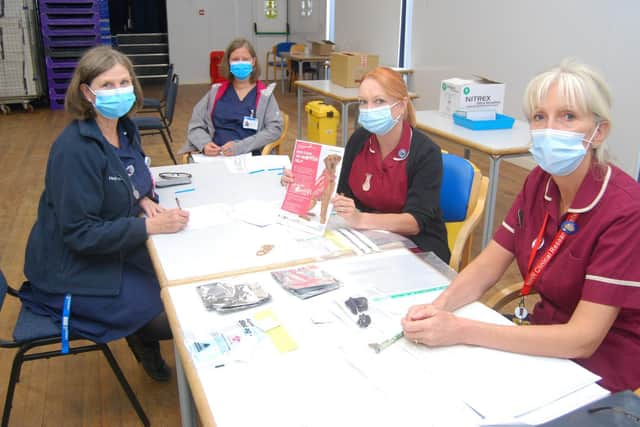

Sheila Brett is a bowel screening administrator in KGH’s endoscopy department. She has worked for the trust for 25 years and volunteered for the trial at the first opportunity.
She said: “The reason I wanted to take part was because I lost my father to Covid-19 in April and my aunt in May. I have also seen my colleagues catching the illness.
“I think it is very important that we find ways of detecting the virus as quickly and easily, and as early, as possible. In this way we can all start to get our lives back to some sort of normal and resume things that we all look forward to, like holidays.”
Advertisement
Hide AdAdvertisement
Hide AdKettering General Hospital’s research lead nurse, Joanne Walsh, said: “We are very excited and honoured to be taking part in this amazing clinical trial which could have huge implications for managing Covid-19 worldwide.
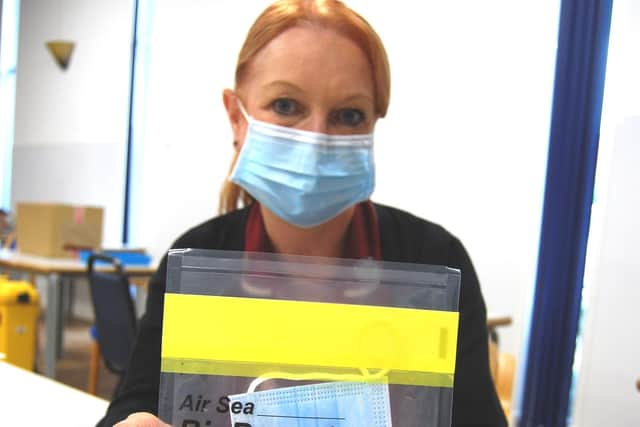

“Our contribution involves recruiting staff volunteers from colleagues who are about to have a Covid-19 swab test. After having their swab test we ask them to wear special nylon socks for 12 hours and a mask for three hours and then to bag these up and return them to us.
“We then send the samples - along with whether the person has tested positive or negative for Covid-19 - to the team who are doing the research with the dogs in Milton Keynes.
“The dogs are trained to sniff the samples and indicate whether they are positive or negative. This can then be compared with the actual test results on the person to see if the dog was
right.”
Advertisement
Hide AdAdvertisement
Hide Ad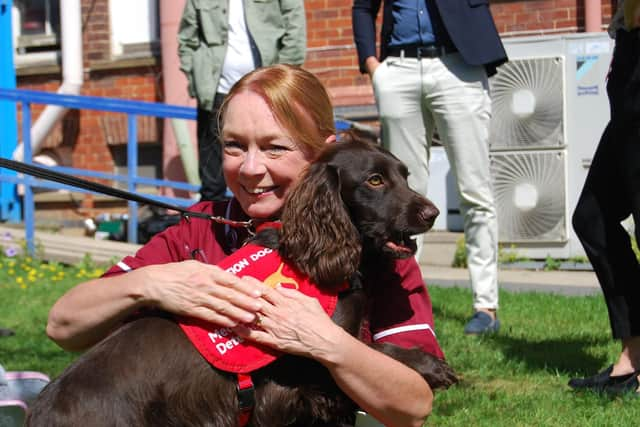

The trial is being led by the London School of Hygiene and Tropical Medicine (LSHTM) in collaboration with the charity Medical Detection Dogs and Durham University with the first phase funded by the Department for Health and Social Care (DHSC).
Nationally the aim is to recruit at least 3,500 staff members to provide samples, with a target of collecting 1,000 samples – 325 positive and 675 negative – in order to confidently ascertain if these dogs can accurately detect the disease.
Once the samples have been collected they are taken to LSHTM, where they are being processed and analysed to identify compounds in odour that signify when someone is infected with Covid-19. They are then sent to a training centre in Milton Keynes where the dogs will undergo training with the samples.
KGH finance analyst Wendy Thorpe, who has also signed up the trial, said: “Members of my family, including my father, sister, brother-in-law and mother-in-law, all have medical conditions which make them very vulnerable to Covid-19.
Advertisement
Hide AdAdvertisement
Hide Ad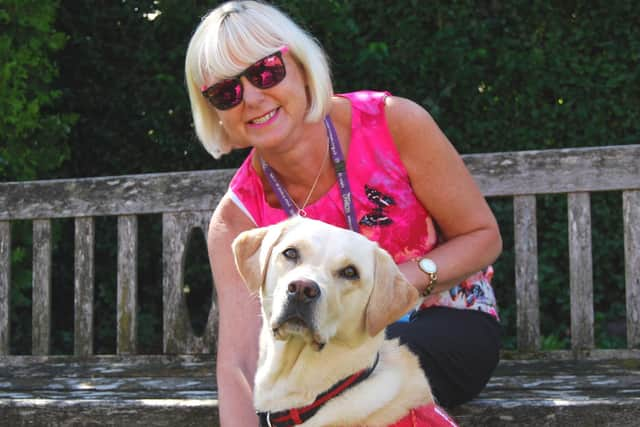

“So I was very keen to do absolutely anything I could to help in the fight against it. If this works and dogs are able to detect the virus early on it could save many lives and prevent the spread of this terrible illness.”
Ophthalmic deputy sisters Heather Hart and Sarah Jones have also volunteered for the trial.
Sarah said: “During coronavirus 80 per cent of our ophthalmic team were re-deployed to other parts of the hospital, including frontline wards and intensive care.
“We have seen how terrible this disease can be and want to do our part in the fight against it.”
Advertisement
Hide AdAdvertisement
Hide AdHeather added: “Like everyone we just want to help get things back to normal and this will be hopefully one way we can help that to happen by being able to detect coronavirus very quickly and easily.”
Dr George Tsaknis is a respiratory consultant at KGH and principal investigator (lead doctor) for the trial at the hospital.
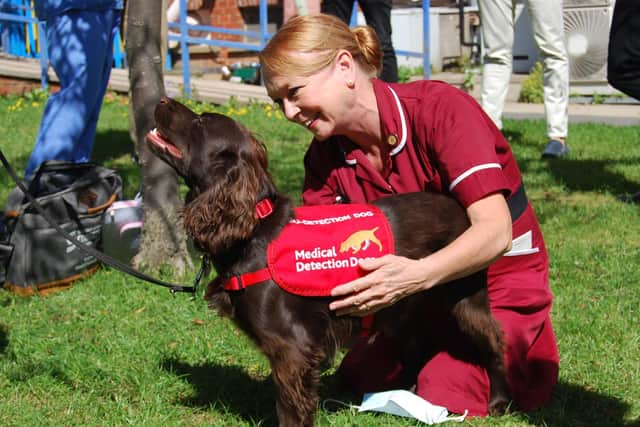

He said: “We are proud to be the top recruiting NHS trust in the country for this trial, which is led by the London School of Hygiene and Tropical Medicine.
“I need to give huge credit to our fantastic hard-working research nurses and research staff, and of course our volunteers from the trust.”
Advertisement
Hide AdAdvertisement
Hide AdDr Bryony Cotterell is a research and development officer at KGH and has been involved in research for the last seven years.
She said: “During the Covid-19 pandemic, as a hospital, we have done a lot to help treat very poorly patients. Taking part in this research with the detection dogs will help in another way by developing a new way to spot the virus in people and help to prevent it spreading.
“If the research is successful it will mean that dogs will be able to very quickly work through a large number of people and detect anyone who has developed the virus - who may not even know they have it. This will be an amazing way to keep people safe at places like airports and potentially hospitals."
Professor James Logan, head of the Department of Disease Control at the London School of Hygiene and Tropical Medicine, said: “If successful, this trial could revolutionise how we diagnose the virus, leading to the rapid screening of high numbers of people, even if asymptomatic, helping return our lives back to some sort of normality.”
Advertisement
Hide AdAdvertisement
Hide AdClaire Guest, chief executive and co-founder of Medical Detection Dogs, said: “Samples provided by NHS staff and their families will be key to the success of this trial and we’re very grateful to everyone who is supporting the project in this way.
“Our dogs have already successfully detected different types of cancer, Parkinson’s and malaria among other diseases which affect millions of people around the world. We are very proud that a dog’s nose could be part of a solution to find a fast, non-invasive way of diagnosing Covid-19 and make a tangible difference to any future pandemics. We look forward to sharing the news that the dogs can find the odour of the virus and the accuracy levels they achieve.”
Professor Steve Lindsay, from the Department of Biosciences at Durham University, added: “If we can show that our trained dogs can identify people carrying the virus, but who are not sick, it will be a game changer. We will then be able to scale-up the use of dogs at ports of entry to identify travellers entering the country with the virus. This could be very important to help prevent a second wave of the epidemic.”
Message from the editor:
Thank you for reading this story on our website. While I have your attention, I also have an important request to make of you.
Advertisement
Hide AdAdvertisement
Hide AdIn order for us to continue to provide trusted local news on this free-to-read site, I am asking you to also please purchase a copy of our newspaper.
Our journalists are highly trained and our content is independently regulated by IPSO to some of the highest standards in the world. The dramatic events of 2020 are having a major impact on many of our local valued advertisers and consequently the advertising that we receive.
We are now more reliant than ever on you helping us to provide you with news by buying a copy of our newspaper.
Thank you
Comment Guidelines
National World encourages reader discussion on our stories. User feedback, insights and back-and-forth exchanges add a rich layer of context to reporting. Please review our Community Guidelines before commenting.